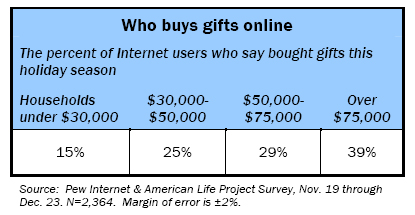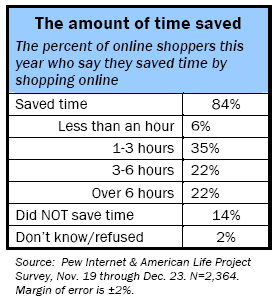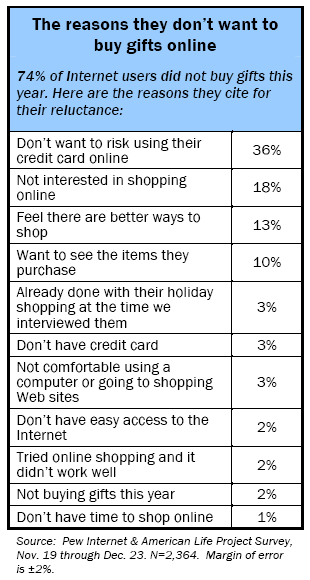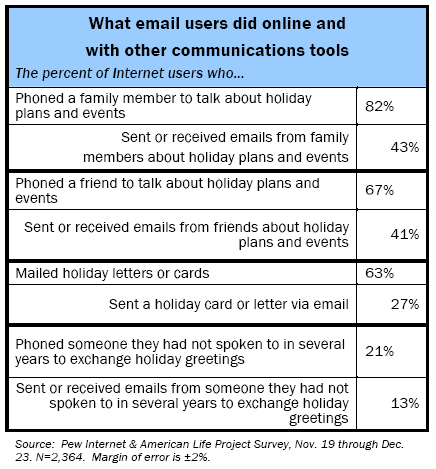Part 1: Shopping and gift buying online
The overall e-shopping picture
Online shopping continues to grow as a popular Internet activity. Since we have begun to track online activity in March 2000, the overall size of the online shopping population has grown from 44 million people (the number of those who have ever bought a product online) to 64 million people. In December 2000 about 52% of Internet users had done some kind of shopping online. This year 58% of Internet users were doing so.
On a typical day during the holiday season this year, more than six million people were buying products online on a typical day, up from less than four million who shopped on a typical day in March 2000 and about five million who were e-commerce on a typical day in December 2000.

In all, 26% of Internet users bought gifts during this holiday season, which we measured from November 19 through December 23. That represents close to 29 million people. By comparison, 20% of Internet users bought gifts last year during the same period – that represents slightly fewer than 20 million people.
Some of the sharpest increases in the online gift-buying population came among minorities and young users of the Internet – those between ages 18 and 29. Still, the relatively well-to-do are the most likely to buy holiday gifts online. Some 39% of those in households earning more than $75,000 bought gifts online, compared to 15% of those in households earning less than $30,000.
Still, online shopping was only a part of most of these users’ gift buying experience. Just 19% of those who bought gifts online say they bought most or all of their gifts via the Internet. About a third of the gift buyers (32%) said they bought some of their gifts online and 48% of them say they bought only a few of their gifts online.
Women surpass men as e-purchasers
For years, men dominated the online shopping universe. That made sense because men were more likely to be early adopters of the Internet, to feel more comfortable providing their credit card information online, and to feel there were advantages to the ease of purchasing goods online. Women began to catch up as their numbers online grew dramatically starting in mid-1999. Still, as of December 2000, the online situation was this: 52% of those who had ever shopped online were men. About 54% of the men with Internet access had bought products online, compared to 50% of the women who had Internet access.
In the intervening 12 months, the online shopping population has tilted towards women. In December 2001, 52% of those who had ever purchased goods online were women and 58% of those who bought holiday gifts online between Thanksgiving and Christmas in 2001 were women. Another way to look at the same issue is to note that 31% of female Internet users bought gifts online this holiday season, compared to 22% of men.
Online women and men were equally likely to get gift ideas online or to do price comparisons of products online. In all, 43% of online Americans used the Internet to look for gifts and 32% used the Internet to compare prices on gifts.
Finally, women enjoyed holiday gift shopping more than men did. Some 37% of women say they enjoy it a lot, compared to 17% of men. Conversely, 29% of men say they do not at all enjoy holiday shopping, compared to 15% of women.
Online shoppers spent more this year than last
The average online shopper spent $392 this year, compared to $330 last year. For e-retailers, one bit of good news is that many online shoppers continued to purchase goods online up until the final weekend before Christmas. However, those who procrastinated on their gift purchases spent less on their items than those who got their online shopping out of the way in late November or early December. Those early purchasers spent an average of $411 on gifts, compared to the late shoppers (those who bought in the last week), who spent an average of $366 on gifts.
One thing that didn’t take off on the Internet in any pronounced way was online wish lists for gifts. Last year, 5% of Internet users set up such lists; this year, 4% did it. Young Internet users (those between ages 18 and 29) were a bit more likely to have done that, but just 7% of them posted holiday wish lists.
Saving time and money
Fully 84% of online shoppers believe they saved time by making their purchases via the Internet. That is an increase from the 79% who believe they shaved time off their shopping experience by purchasing gifts last year.

Newcomers to e-gift buying were among the most enthusiastic of those who valued the convenience of buying gifts online.
Some 60% of online shoppers say they saved money by ordering online, up from 52% last year. That was especially true for African-Americans and Hispanics with Internet access. Younger Internet users, those ages 18-29 also were among the most enthusiastic about the cost savings they realized by online shopping.
About half (49%) of online shoppers say they were very satisfied with the gifts they bought online. Some 53% of women said this, compared to 45% of men. Interestingly, this is a somewhat lower level of overall enthusiasm than online shoppers reported last year. Some 60% of online gift buyers last year said they were very satisfied with the experience.
Shopping from work
A third of online gift buyers (32%) did at least some of their holiday shopping from work, up from 26% of Internet users doing their shopping from work last year. Those who did so this year were among the most satisfied with the online gift-buying experience and they were particularly likely to report that they had saved significant chunks of time in making their purchases online, rather than in stores.
Fully 93% did at least some of their shopping from home, up from 85% last year.
The changing gift-buying population
More than a quarter (27%) of those who bought gifts this year were newcomers to e-commerce. They had never done it before. Many of the newcomers were from households earning between $30,000 and $75,000. Also, a high proportion of Internet users from households earning less than $30,000 were using online resources to look for gifts and compare prices.
However, there were also dropouts. A third of Internet users who did not buy gifts this year had bought gifts online in the past. Many expressed some degree of unhappiness with the online shopping experience as a reason for not shopping online this year. Among the things they said were that there are better ways to shop, and that they had unpleasant shopping episodes on the Internet in the past because the merchandise sent to them was wrong, or it didn’t arrive on time or they worried about the security of their credit card information.
The 74% of Internet users who have never shopped for gifts online cite concerns about the security of their credit card information as the primary reason they have not done so. They also believe there are better ways to purchase goods than online.
About a quarter of Internet users (27%) say that at some point during their online browsing they were starting to buy something, but then changed their minds and decided not to make the purchase.
Anxieties about online shopping
All Internet users – gift buyers and non-buyers alike – express concern about problems that can afflict online purchases or preferences for shopping in stores. Some 82% of Internet users say they like to be able to see the gifts they buy in a store before the purchase; 72% of Internet users say they don’t like giving out their credit card information or personal information over the Internet; 53% they worry that they will find a cheaper version of the same product in a store or catalogue instead of online; and 41% say some Web sites make shopping online too confusing.
In addition, 43% of Internet users say they worry that the gifts they order online will not be delivered on time and 16% of those who have ever bought gifts online say they actually had problems getting the gifts delivered on time.

Part 2: Online socializing and the holidays
More online socializing and spiritual activity than e-commerce
The increase in e-tail activity during the holidays this year is a significant development. Still, it is part of a bigger picture of how the Internet is being woven into users’ everyday lives. The amount of socializing and spiritual activity online during recent weeks has easily surpassed the amount of activity that can be attributed to e-commerce.
Fully 64% of Internet users used email and the Web to make contact with each other and for holiday-season spiritual searches or celebration ideas this year. That compares to the 48% of Internet users who went online to get gift ideas, or compare prices on gifts, or actually purchase gifts online. Thus, 33% more people socialized online than used the Internet for any type of e-commerce. It is also a higher level of online holiday communication than we recorded last year, when 53% of Internet users went online to plan or chat with family and friends about the holidays.
Email use
More than one in four email users (43%) used online communication to contact family members about holiday plans and events; a similar proportion (41%) sent or received emails from friends about holiday plans and events; a quarter of email users (27%) sent holiday letters or cards online; and 13% of email users sent or received emails from someone they had not spoken with in several years to exchange holiday greetings.

The phone and the postal system still are preferred over the Internet for holiday greetings, even by Internet users
Internet users are generally more socially active than non-users. One major sign of this is that Internet users are more active in their use of the phone system and the postal system than non-users. Fully 95% of Internet users reached out to family and friends using the phone and the mail system during the holiday season, compared to 87% of non-Internet users. What is even more striking is that the heaviest Internet users, the ones with the most experience online and the ones who log on daily are also the people who are most active in using the phone to contact family and friends and the postal system to send cards to loved ones.
Even when they have Internet options for making contact with others, more Internet users opt for using the phone and the mail system than use email.
Since the terror attacks on September 11, we have noticed that significant numbers of Internet users have used email and Web searches to find long-long family and friends and reconnect with them. During the holiday season, we found that 13% of email users had made those contacts. Still, more of them used the phone to make such connections – 21% of email users did that.
Web searches and the holidays
In addition to using email, some Internet users searched for inspiration online in recent weeks. Almost a quarter of Internet users (23%) looked online for new ideas about crafts, food, or other ways to celebrate the holidays and 11% researched religious materials or traditions related to the holidays. Another 6% used the Internet to find ways to attend or participated in holiday celebrations or religious services.
As is often the case, Internet veterans who have more than three years experience were the most likely to have been active on the Web for these purposes.
Part 3: The holidays and Americans’ response to terror
Background
After the terror attacks on the World Trade Center and the Pentagon on September 11 and the first reports of anthrax infections in early October, there was substantial speculation that Americans with Internet access would change some key behaviors. For example, some thought that Internet users might turn even more to online shopping because of their fears that malls and other public places might be terrorist targets. In addition, there was interest in whether Internet users would resort to even more email use and less use of the postal service because of the problems they associated with sending and receiving letters
In our holiday survey, we found that significant numbers of Americans (both Internet users and non-users) wanted to assist the country’s relief efforts and made contributions to them, but only a small fraction of Americans adjusted their activities in response to their fears in new national environment.
Donated to relief efforts
More than four in ten Americans (44%) say they made donations to relief efforts during the holiday season and three-quarters of them said they did it because of recent events. Internet users were almost twice as likely as non-users to have made such contributions because of the recent terror attacks.
Women, Hispanics, and relatively well-off families were also among the most likely to make such contributions.
About 7% of Internet users made their contributions online. That amounts to about eight million people.
Cancelled holiday trips
About 8% of Americans say they cancelled holiday trips that they would normally take. African-Americans and those living in households earning less than $30,000 were among the most likely to say they had cancelled a trip.
Avoided malls
Some 11% of all Americans (Internet users and non-users alike) say they did not go to malls or other big stores that they might usually have patronized during the holiday season but virtually all of them say their decision had nothing to do with their fears about terror attacks.
Some 9% of Internet users say they shopped online instead of going to malls during the holidays. However, the vast majority of them say that had nothing to do with recent events. Other factors made them prefer e-shopping – many said they like the convenience of online shopping and find it better than buying items from catalogues by phone. College graduates and those living in high-income households (those earning more than $75,000) were among the most likely to say they shopped online rather than going to malls or big stores. Those who stopped shopping in stores in favor of online shopping were heavy Internet users with a good deal of Internet experience.
Sent email greetings instead of holiday cards
One in ten Internet users (10%) say they sent email greetings this year instead of holiday cards through the postal service. Again, though, virtually all of them say they did this for reasons other than their concerns about using the postal system in the wake of anthrax scares. Those most likely to substitute e-greetings for cards are the heavy, daily users of the Internet who have a good deal of online experience.
Some 10% of non-Internet users also said they avoided sending holiday cards this year, but the vast majority said their decision was not based on their concerns stemming from the anthrax attacks.
Attended religious services
About 11% of all Americans say they attended a religious service during the holiday season that they might not normally have attended. They were evenly split between those who said they were inspired to go to the services because of the terror attacks and the aftermath and those who said the attacks had nothing to do with their decision to go to church. Hispanics and those from households earning less than $30,000 were among the most likely to have gone to a service they might not have attended in previous years.


